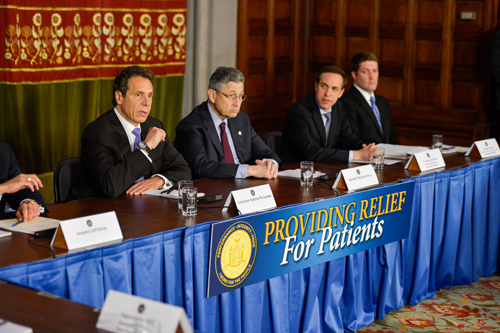North Fork reps split as New York OK’s medical marijuana

New York State is on track to become the 23rd state in the country to allow the sale of medical marijuana. State Senators passed a measure Friday afternoon, the Assembly did the same Thursday night and Gov. Andrew Cuomo is poised to sign the bill.
North Fork representatives Ken LaValle and Anthony Palumbo split on the measure, with Mr. Lavalle (R-Port Jefferson) opposing the bill today and Mr. Palumbo (R-New Suffolk) voting in favor last night.
The 24-page Compassionate Care Act, as the bill was called, passed by votes of 49-10 in the Legislature’s upper house and 117-13 in the lower house.
Passage comes about six months after Gov. Cuomo said in his State of the State address that he hoped to launch a pilot medical marijuana program at state-run hospitals.
Mr. LaValle said on the floor of the state Senate Friday afternoon that he saw the bill as “a beginning” to better legislation, though he considered its content as a whole “very alarming” — too alarming for him to support.
“There’s too much in here that troubles me about [this bill’s] unintended effects,” he said. Mr. LaValle said he was concerned the bill would lead to making marijuana a recreational drug across New York State.
But Mr. Palumbo — who voted against a previous version of the bill just weeks ago — eventually came around to support it, as did the governor himself and many members of the Republican-led state Senate. Leaders of both houses announced the bill’s passage at a press conference on Thursday.
The North Fork assemblyman said he saw safeguards written into the bill that hadn’t been there previously — namely, outlawing smoking marijuana for medicinal use and criminalizing patient-to-patient distribution, as with any other controlled substance.
“They cleaned up a lot of concerns I had,” Mr. Palumbo said. “But there are clearly valid medicinal uses for marijuana — for people with epileptic seizures, different neurological disorders and so on. So that was the main reason I voted yes. It’s not a perfect bill. But there were tremendous concessions made.”
He added that he is “completely against legalization” and saw a prior version of the bill as an effort to eventually make the substance legal.
The legislation will establish a registry process and require patient ID cards for those seeking to use marijuana, which will be available only in edible and vaporized form. The state’s department of health now has 18 months to develop guidelines regulating dosage amounts — a point that opponents said illustrated a lack of current knowledge on the topic.
According to the legislation, the governor can also suspend or terminate the medical marijuana program at any point based on recommendations from the health commissioner or superintendent.
In the state Senate, the measure was sponsored by Senator Diane Savino (D-Staten Island), who spoke on the floor before the vote about her parents, both of whom suffered from lung cancer.
“During that period of time,” she said, “I realized for my mother and father, as well as my grandfather, that they had one of two choices: They could suffer or continue to be prescribed seriously addictive narcotics. At that point, it didn’t matter.”
Several state senators on Friday pointed to concessions in the bill that ultimately led to its approval. Gov. Cuomo did the same in a statement released Thursday, before the state Senate vote.
“This legislation strikes the right balance,” he said. “Medical marijuana has the capacity to do a lot of good for a lot of people who are in pain and suffering and are in desperate need of a treatment that will provide some relief. At the same time, medical marijuana is a difficult issue because there are risks to public health and safety that have to be averted.”
A 7 percent excise tax will apply to medical marijuana. Tax revenues will be divided among the counties where the product is manufactured and dispensed, the state Office of Alcoholism and Substance Abuse Services and the Division of Criminal Justice. The state will identify five manufacturers, each of which will be permitted to operate up to four dispensaries. No specific locations have been determined.








